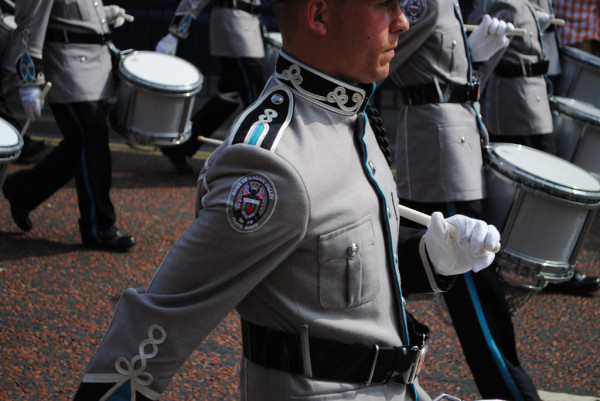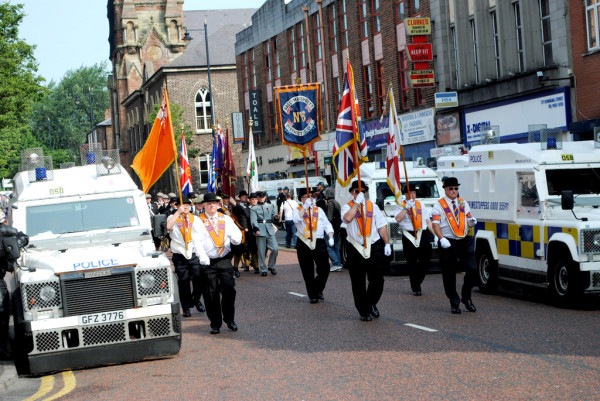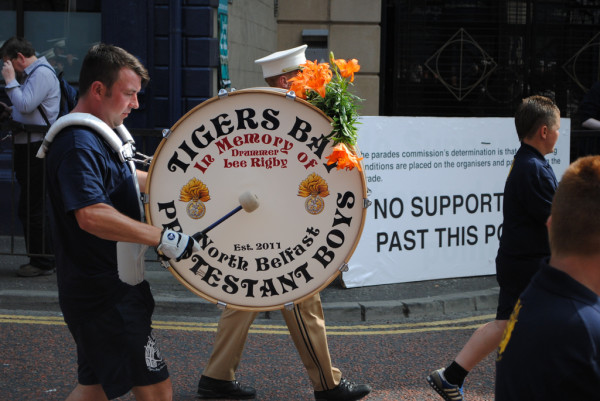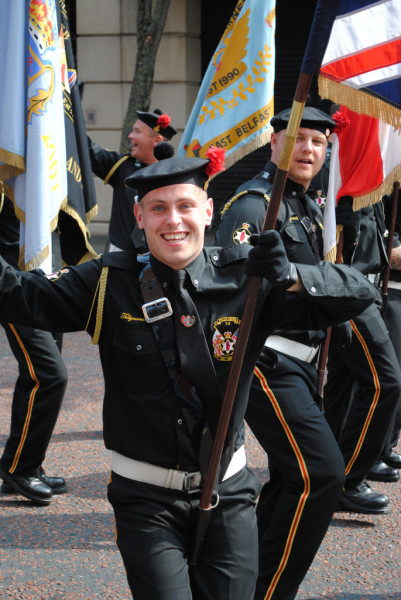
Twelfth of July, Donegall Street, Belfast, 2013. Dominic Bryan, via Flickr
A few years ago, I found myself in a very Protestant part of Belfast trying to convince neighborhood kids that they should be nice to Catholics. I was working for a nonprofit, driving all over Northern Ireland to direct sports programs that bussed groups of children back and forth between Protestant and Catholic enclaves. Americans would probably describe the work we did as “peace-building,” but locals in Belfast called it “community relations.”
My colleague Joanne, a Catholic, had come with me to east Belfast to talk to kids who were part of a soccer program there. Programs like this are often funded by foundation grants that mandate a community-relations component. The danger is that the participants sometimes felt duped. They were there to play soccer but found out they had to listen to our spiel first. Challenging the convictions they’d grown up with invited resentment, too, especially when the hosting adults didn’t really buy in. And that’s the exact scenario Joanne and I ran into.
A sixtyish man named John (a pseudonym) greeted us. The conversation started out friendly enough, but then he informed us that our allotted time had been cut in half. “You don’t mind, do you?” he asked. “The boys really just want to play football.”
To cut our time was a breach of contract, but I wasn’t about to bring that up. John wasn’t done talking, anyway. He had another request: could we please refrain from mentioning Gaelic football tonight? (In Northern Ireland, Protestants play rugby and Catholics play Gaelic football, but we made a point of talking to our kids about both sports.) Gaelic football is a sectarian game, John insisted. He doesn’t want to be friends with any of those Catholics anyway. Buncha terrorists. Besides, he knows some of them, and they wouldn’t go near a rugby pitch. And don’t even get him started on those Lithuanians who keep coming in and stealing his people’s jobs.
Neither Joanne nor I really knew what to say. To be honest, I just wanted to get the hell out of there. There were other adults from the soccer club around, and they seemed embarrassed. They awkwardly pulled us away and led us to a room with window views of the pitch. For the rest of the evening, teenagers circulated through the room to participate in our activities. We talked about Gaelic football. We said that anybody should be able to play sports because they’re fun and a good way to bring people from different backgrounds together.
One boy was not so sure. “I know one person around here who would disagree with all that,” he said.
The boys sat up straight when John entered the room and sat ominously at the end of the table. I let Joanne do as much of the talking as possible, and she handled it like a pro. She’d been working in community relations for years. To my surprise, John stayed quiet, and I wondered if someone had told him to ease up on us for the rest of the evening.

Photo by Dominic Bryan, via Flickr
Northern Ireland may have originated as a legal entity in 1921, when the British Parliament split Ireland in two, but its history of nationalist conflict stretches back to when King Henry II of England first landed in 1171 and took control of the island. Much later, from 1919 to 1921, the Irish Republican Army fought British forces in a war for Ireland’s independence. It was during those years of conflict that the infamous episode known as “Bloody Sunday” occurred. On November 21, 1920, the IRA assassinated fourteen British operatives in Dublin. Later that day, an occupational police force known as the Royal Irish Constabulary retaliated at a football match, killing fourteen civilians.
After Ireland was partitioned, the southern part of the island became independent. A sizable Irish Catholic community lived in Northern Ireland as well, and the Irish nationalists, or republicans, wanted to join the new nation. But Northern Ireland’s population was mostly unionists, or loyalists, who wanted to stay a part of Great Britain. The tensions between the two sides culminated in the Troubles, a conflict from 1968 to 1998 that led to more than 3,600 deaths. As many as 50,000 were injured, sometimes from gruesome practices like kneecapping.
When I arrived in Belfast for my job, I barely knew the distinction between Northern Ireland and its tourist-friendly neighbor to the south. Back in the United States, my father’s family are practicing Catholics, and my mother comes from a family of Protestants. I thought this background would help me understand Northern Ireland, but I was completely wrong. To call the dispute there a religious conflict is almost a misnomer. Sure, there are Protestant and Catholic churches that subscribe—with differing levels of rigidity—to conflicting beliefs about God. But the most salient identities in Northern Ireland nowadays seem to have little to do with disagreements about, say, transubstantiation. Instead, they have to do with culture—and also, to some degree, class.
Furthermore, the conflict today is played out in often hidden ways. As my coworkers warned me, questions about which school you attended or what part of the city you live in or what sport you play are often subtle attempts to peg allegiances. They are about figuring out what side you are on—what flag you fly in a war over national pride and cultural dignity that has never really ended.

Photo by Dominic Bryan, via Flickr
A few weeks after my encounter with John, I was near the city center, driving home from work. I stopped at a red light. Before the light changed, a mob of people holding British flags rushed into the intersection. They planted themselves there, chanting. I tried to slide over to the right lane to make a turn. Several protesters anticipated my move and ran over to block the way. I wanted to keep driving, but I didn’t need any legal troubles, especially as a foreigner. So I stopped and waited. The demonstration backed up more and more traffic behind me, but the crowd was in no hurry.
This was my first experience with the demonstrations that were happening all over the city, every night for weeks, in response to a Belfast city council decision that the Union Jack would only be flown at city hall on specific holidays rather than every day. On a few occasions, Protestant disgust with the decision had turned violent, with young men burning cars and throwing bricks and petrol bombs at police officers, and explosive devices winding up in cars and in the mail.
My coworkers and friends in Belfast—many of them educated, liberal, and middle-class—were impatient with the protesters. “It’s just a flag,” they would say. Or, “It’s just a few crazies. I don’t understand how people can be so ignorant.”
As I sat in my car waiting for the protesters to disperse, it was easy to sympathize with that attitude. But the more time I spent in Northern Ireland, the more that I realized that things were complicated. For instance, there was a socioeconomic component that hardly anyone mentioned. Many of the protesters came from the neighborhoods where I worked. I knew what the housing looked like there, what the children wore. They were working class. The most embittered among them seemed to be men with few prospects, whose best option to make money was either applying for welfare or joining the military. I could understand the appeal of simply drinking one’s life away in a pub with other rowdy and angry men, instead of dealing with a hopeless future. On top of all the pressures these working-class men and women faced in their day-to-day lives, now politicians were stripping away their very identity: first their political power, and now their national dignity.
Through work, I met Will Maloney, a documentary filmmaker who had worked extensively with low-income Protestants in Belfast. He was well-connected and had even gotten to know a few men with paramilitary backgrounds, guys with terrifying pasts. “Most unionist parties didn’t come from the working class,” he told me. “They were considered parties of the State. So some Protestants in Northern Ireland have a history of underrepresentation.”
After I got trapped in that street demonstration, I wanted to learn more about what Protestants thought about the flag. I attended a panel discussion with representatives from all of the country’s major political parties save Sinn Féin (the highly nationalistic Irish Catholic party). As an American, it was interesting to watch a real multiparty debate. In addition to the Protestant/Catholic split, there were varying conservative and liberal perspectives under those two broad religious banners. I trusted one panelist in particular: Trevor Ringland, a former rugby star with a Protestant background. Sometime after his playing days ended, he had transitioned into politics. He seemed to genuinely want what was good for all sides.
Northern Ireland, Ringland said, had moved from violent conflict to a cold war—and now, to a “cold peace.” The next step, he argued, had to be a “constructive peace,” which would require more from the Northern Irish than living in separate neighborhoods and attending separate schools. It would require integration. It would require feeling, seeing, and healing old wounds.
I was moved by his speech, but I also could not help but notice that Ringland’s political moderation came from a privileged perspective. Yes, he had lived through the Troubles, but he had also been a professional athlete—and not just any rugby player, but the player on Ireland’s team who had scored the “Try of the Century” against the Scots to win them the Five Nations Championship in 1985. He was a local hero who had lived a good life, and so it was possible for him to believe in a good life.
Not everyone in the room had that luxury. Although the Good Friday Agreement, the 1998 peace accord brokered by US president Bill Clinton, had aimed to bring about a more equal and just society in Northern Ireland, one Protestant panelist called the peace process “incomplete.” Among those left behind were certain Protestant communities—specifically, the least educated, least employed ones.
The conversation got tense during the audience Q&A. Someone asked why, if the nationalist community was really interested in a “shared future,” did a park in Newry get named after a “terrorist”? Others accused loyalist protests of hurting the Northern Irish economy and its international reputation. Tempers flared, audience members interrupted speakers, and tears flowed.
I went home thinking about how the Northern Irish weren’t really that different from Americans. They chose segregation not because it’s better, but because it’s easier.

Photo by Dominic Bryan, via Flickr
I had been hearing about the Twelfth of July ever since I arrived in Northern Ireland. The holiday commemorates the Battle of the Boyne. In that decisive encounter in 1690, Protestant forces led by King William defeated King James’s Catholics near the Boyne River, some thirty miles from Dublin. Many Protestants practically live for the day, while some Catholics hate it so much they leave town. The Twelfth has become so fraught with emotion that there is a government agency—the Parades Commission—charged with keeping the celebration safe. That year, a controversial ruling by the commission prohibited marchers from taking a return route through Ardoyne, a feisty Catholic area in north Belfast.
I was determined to experience at least part of the holiday, so I headed downtown to the celebrations. After parking my car, I walked in the direction of piping flutes and banging drums. A crowd of thousands stood on each side of the street, watching band after band march through. I saw blue football jerseys for the Glasgow Rangers in every direction, and the Union Jack used in all sorts of creative ways: as a shirt, skirt, even a hat.
Before, a friend had told me that what is so disturbing about the Twelfth is that its uniting force—what is actually celebrated—is hatred of a particular demographic. Watching the parade, I detected a certain triumphalism in the way some people were celebrating. But it seemed to be only part of the story. I mostly saw smiles. There were angry men there, but there were also old ladies, mothers, and children. People shared their food. Musicians played their tunes. Marchers tossed their poles. I felt myself getting in step with the martial beat of the drums, just like I’d done years ago as a cadet in military school.
My own best guess is that any real shared future in Northern Ireland will find a place for the Twelfth of July commemoration. I don’t think working-class Protestants—or any of us, for that matter—can entirely shed such a potent part of their identity, even in pursuit of peace. By the same token, extinguishing the hatreds and distrust that give that celebration a bad name will require taking seriously the sometimes inconvenient voices of this sizable group.
The more disconcerting part of the Twelfth of July celebration took place the night before. Protestants all over the city gathered around bonfires after dark. A few of my friends took me around to see them, though my friend Paddy warned me—or maybe “begged” is more accurate—not to call out his name. When I heard “bonfires,” I thought of quaint little gatherings: roasting marshmallows, singing Kumbaya. Not so. In Protestant neighborhoods the partygoers lit pallets stacked with wood, their flames reaching as high as three stories. The heat was so intense that we had to stand hundreds of feet away. I was surprised the practice was legal.
Children ran around, while parents danced to blaring music. The beer flowed, and some people were clearly drunk. The police presence seemed minimal and indifferent.
Just off Shankill Road in north Belfast, I spotted a tent where a woman was selling cheap beer out of a cooler. I walked over and ordered a drink. A man behind me heard my American accent.
“Where ya from?” he asked.
“I’m from the States,” I said, uneasily. Other people were turning to listen to us. “I’ve been here for almost a year.”
“What are you here for?” he asked.
“My job,” I said, hoping he wouldn’t ask what my job was.
“What part of town do you live in?”
“Lower Ormeau Road,” I said, thankful that I lived in a neighborhood that wasn’t predominantly Catholic.
“Who are they?” he asked, pointing at my friends.
Maybe I was paranoid, but by then, I was almost certain this man was really only interested in one thing: Was I Catholic? Did I have Catholic sympathies? Was this all a big joke to me, peeking in on the Protestants?
I doubted that continuing the conversation would lead to anything good. It was time to end this little dance. “It was nice to meet you,” I said, excusing myself.
I chugged my beer and tossed the bottle in a trashcan. Then my friends and I got back in our car and drove away.
Chris Schumerth is a writer who lives in Indianapolis. He is currently an MFA candidate at the University of South Carolina. His writing has appeared in Salon, the Miami Herald, Relevant Magazine, and Punchnel’s, among other publications. Twitter: @ChrisSchumerth | Blog: chrisschumerth.com
The post Cold Peace appeared first on In The Fray.